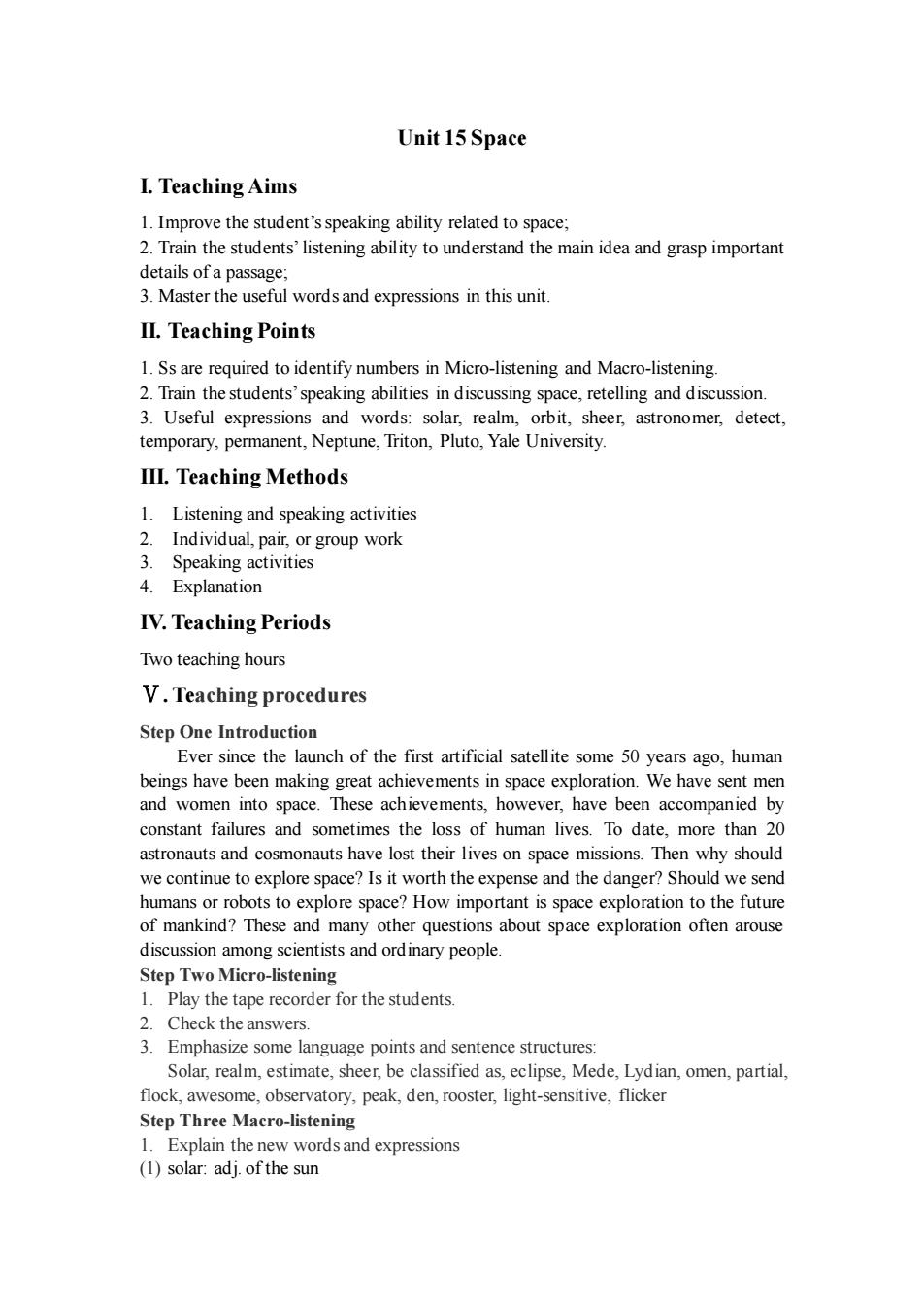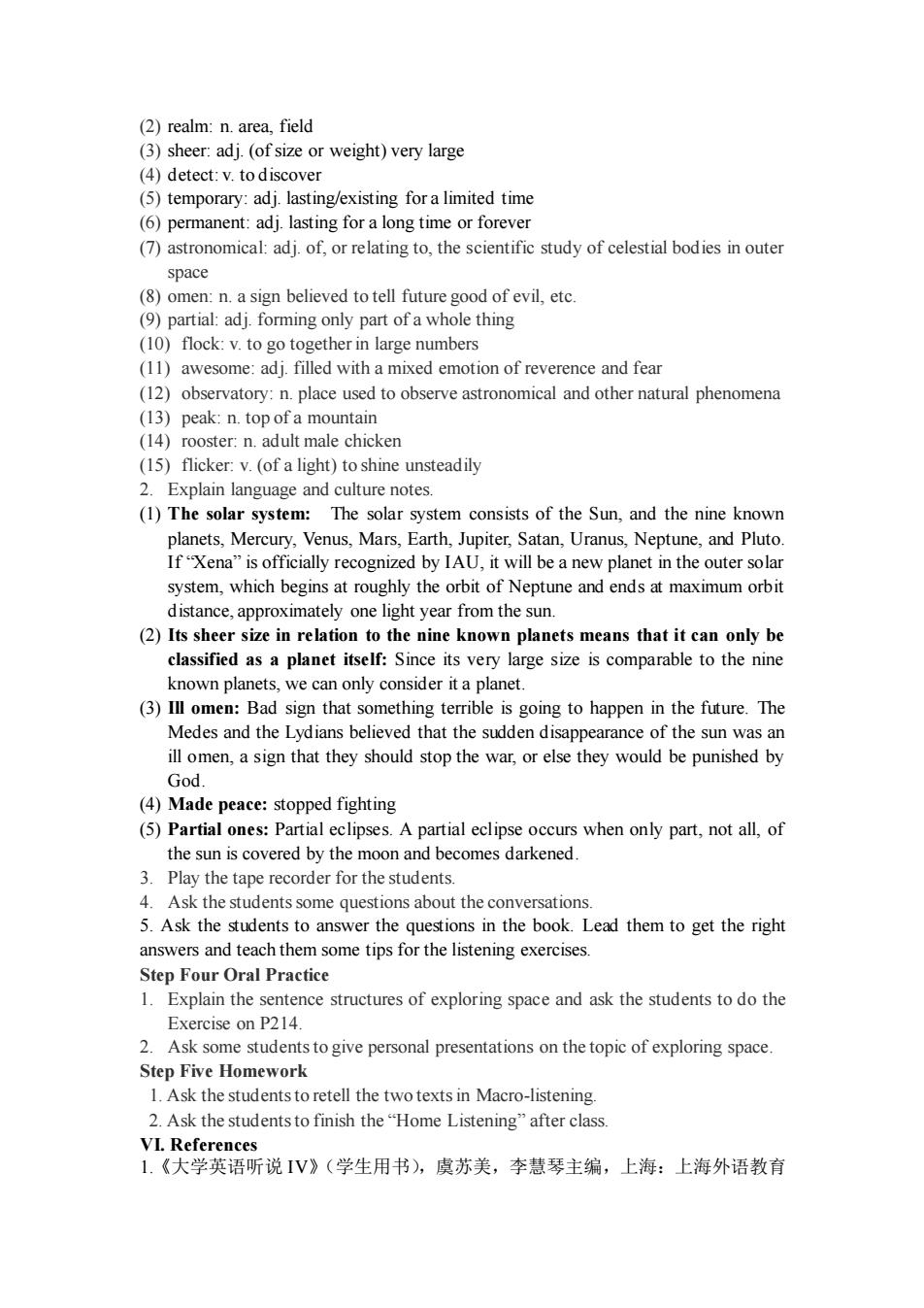
Unit 15 Space I.Teaching Aims 1 Improve the student's speaking ability related to space: 2.Train the students'listening ability to understand the main idea and grasp important details of a pas 3.Master the useful words and expressions in this unit II.Teaching Points 1.Ss are required to identify numbers in Micro-listening and Macro-listening. 2.Train the students'speaking abilities in discussing sp ace,retelling and discussion 3.Useful expressi and words solar,realm sheer,astronomer,detect. III.Teaching Methods 1.Listening and speaking activities Individual,P ir,or group work 3 Speaking activities 4.Explanation IV.Teaching Periods Two teaching hours V.Teaching procedures Step One Introduction Ever since the launch of the first artificial satellite some 50 years ago,human beings have been making great achievements in space exploration.We have sent men and wo pace.These achie nied by constant failures and sometimes the loss of human lives.To date,more than 20 astronauts and cosmonauts have lost their lives on space missions.Then why should we continue to explore space?Is it worth the expense and the danger?Should we send humans or robots to explore space?How important is space exploration to the future of mankind?These and many other questic s about space loration often arouse discussion among scientists and ordinary peop Step Two Micro-listening 1.Play the tape recorder for the students. 2 Check the answers Solar,realm, imate,sheer, ds, lipse,Mede,Lydian,omen,partial flock,awesome,observatory,peak,den,rooster,light-sensitive,flicker Step Three Macro-listening 1.Explain the new words and expressions (1)solar:adi.of the sun
Unit 15 Space I. Teaching Aims 1. Improve the student’s speaking ability related to space; 2. Train the students’ listening ability to understand the main idea and grasp important details of a passage; 3. Master the useful words and expressions in this unit. II. Teaching Points 1. Ss are required to identify numbers in Micro-listening and Macro-listening. 2. Train the students’ speaking abilities in discussing space, retelling and discussion. 3. Useful expressions and words: solar, realm, orbit, sheer, astronomer, detect, temporary, permanent, Neptune, Triton, Pluto, Yale University. III. Teaching Methods 1. Listening and speaking activities 2. Individual, pair, or group work 3. Speaking activities 4. Explanation IV. Teaching Periods Two teaching hours Ⅴ. Teaching procedures Step One Introduction Ever since the launch of the first artificial satellite some 50 years ago, human beings have been making great achievements in space exploration. We have sent men and women into space. These achievements, however, have been accompanied by constant failures and sometimes the loss of human lives. To date, more than 20 astronauts and cosmonauts have lost their lives on space missions. Then why should we continue to explore space? Is it worth the expense and the danger? Should we send humans or robots to explore space? How important is space exploration to the future of mankind? These and many other questions about space exploration often arouse discussion among scientists and ordinary people. Step Two Micro-listening 1. Play the tape recorder for the students. 2. Check the answers. 3. Emphasize some language points and sentence structures: Solar, realm, estimate, sheer, be classified as, eclipse, Mede, Lydian, omen, partial, flock, awesome, observatory, peak, den, rooster, light-sensitive, flicker Step Three Macro-listening 1. Explain the new words and expressions (1) solar: adj. of the sun

(2)realm:n.area,field ()sheer:adj.(of size or weight)very large (4)detect:v.todiscover (5)temporary:adj.lasting/existing for a limited time (6)permanent:adj.lasting for a long time or forever (7)astronomical:adj.of,or relating to,the scientific study of celestial bodies in outer space (8)omen:n.asign believed totell future good of evil,etc. (9)partial:adj.forming only part ofa whole thing (10)flock:v.to go together in large numbers (11)awesome:adi.filled with a mixed emotion of reverence and fear (12)observatory:n.place used to observe astronomical and other natural phenomena (13)peak:n.top a mounta (14)rooster:n.adult male chicken (15)flicker:v.(of a light)to shine unsteadily 2.Explain language and culture notes. (1)The solar system:The solar system consists of the Sun.and the nine knowr Me enus,Mars,Earth,Jupiter Satan,Uranus,Neptune,and Plu isocally reconized by LAU.ilbe a new planet in the outer system,which begins at roughly the orbit of Neptune and ends at maximum orbit distance.approximately one light year from the sun. (2)Its sheer size in relation to the nine known planets means that it can only be e its v arge size is comparable to the nine known planets,we can only consider it a planet. (3)Ill omen:Bad sign that something terrible is going to happen in the future.The Medes and the Lydians believed that the sudden disappearance of the sun was an ill omen,a sign that they should stop the war,or else they would be punished by God (4)Made peace:stopped fighting (5)Partial ones:Partial eclipses.A partial eclipse occurs when only part,not all,of the sun is covered by the moon and becomes darkened. 3.Play the tape recorder for the students. 4.Ask the students some questions about the conversations 5.Ask the studen answer the que n the book.Lead them to get the right answers and teach them some tips for the listening exercises Step Four Oral Practice 1.Explain the sentence structures of exploring space and ask the students to do the Exercise on P214 2 Ask so me studentsto give personal presentations on the topic of exploring space Step Five Homework 1.Ask the students to retell the two texts in Macro-listening. 2.Ask the students to finish the "Home Listening"after class VI.References 1.《大学英语听说V》(学生用书),虞苏美,李慧琴主编,上海:上海外语教育
(2) realm: n. area, field (3) sheer: adj. (of size or weight) very large (4) detect: v. to discover (5) temporary: adj. lasting/existing for a limited time (6) permanent: adj. lasting for a long time or forever (7) astronomical: adj. of, or relating to, the scientific study of celestial bodies in outer space (8) omen: n. a sign believed to tell future good of evil, etc. (9) partial: adj. forming only part of a whole thing (10) flock: v. to go together in large numbers (11) awesome: adj. filled with a mixed emotion of reverence and fear (12) observatory: n. place used to observe astronomical and other natural phenomena (13) peak: n. top of a mountain (14) rooster: n. adult male chicken (15) flicker: v. (of a light) to shine unsteadily 2. Explain language and culture notes. (1) The solar system: The solar system consists of the Sun, and the nine known planets, Mercury, Venus, Mars, Earth, Jupiter, Satan, Uranus, Neptune, and Pluto. If “Xena” is officially recognized by IAU, it will be a new planet in the outer solar system, which begins at roughly the orbit of Neptune and ends at maximum orbit distance, approximately one light year from the sun. (2) Its sheer size in relation to the nine known planets means that it can only be classified as a planet itself: Since its very large size is comparable to the nine known planets, we can only consider it a planet. (3) Ill omen: Bad sign that something terrible is going to happen in the future. The Medes and the Lydians believed that the sudden disappearance of the sun was an ill omen, a sign that they should stop the war, or else they would be punished by God. (4) Made peace: stopped fighting (5) Partial ones: Partial eclipses. A partial eclipse occurs when only part, not all, of the sun is covered by the moon and becomes darkened. 3. Play the tape recorder for the students. 4. Ask the students some questions about the conversations. 5. Ask the students to answer the questions in the book. Lead them to get the right answers and teach them some tips for the listening exercises. Step Four Oral Practice 1. Explain the sentence structures of exploring space and ask the students to do the Exercise on P214. 2. Ask some students to give personal presentations on the topic of exploring space. Step Five Homework 1. Ask the students to retell the two texts in Macro-listening. 2. Ask the students to finish the “Home Listening” after class. VI. References 1.《大学英语听说 IV》(学生用书),虞苏美,李慧琴主编,上海:上海外语教育

出版社,2006 2.《大学英语听说IV》(教师用书),虞苏美,李慧琴主编,上海:上海外语教育 出版社,2006. 3.大学英语语法.薄冰主编.山西:山西教育出版社,2006 4.大学英语实用语法讲解与练习.任福洪等主编.北京:国防工业出版社,2004 5.牛津高阶英汉双解词典(第六版).牛津大学出版社,2004
出版社,2006. 2.《大学英语听说 IV》(教师用书),虞苏美,李慧琴主编,上海:上海外语教育 出版社,2006. 3.大学英语语法. 薄冰 主编. 山西:山西教育出版社,2006. 4. 大学英语实用语法讲解与练习. 任福洪等主编. 北京:国防工业出版社,2004. 5. 牛津高阶英汉双解词典(第六版). 牛津大学出版社,2004